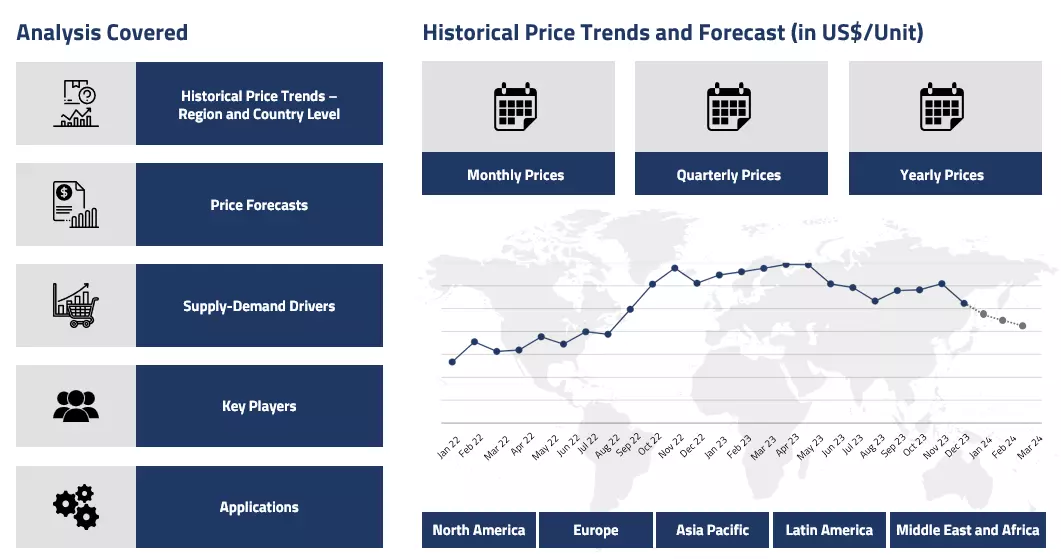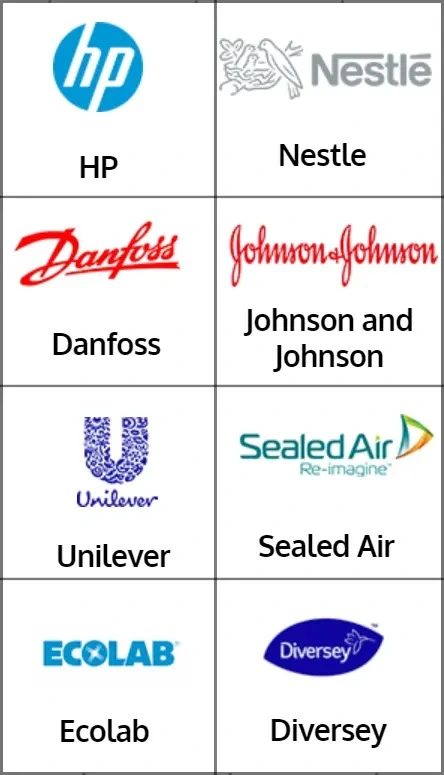Product
Biodiesel Price Trend and Forecast
Biodiesel Price Trend and Forecast
Biodiesel Regional Price Overview
Get the latest insights on price movement and trend analysis of Biodiesel in different regions across the world (Asia, Europe, North America, Latin America, and the Middle East & Africa).
Biodiesel Price Trend for the First Half of 2025
Asia
In the first half of 2025, biodiesel prices in Asia showed a declining trend overall. Weak demand from the transport and industrial sectors, combined with high inventories and limited blending mandates, kept the market under pressure. Export challenges intensified after major Western markets introduced steep tariffs, forcing Asian producers to redirect cargoes within the region. This led to a temporary oversupply situation, which further pushed prices down.
Biodiesel Price Chart

Please Login or Subscribe to Access the Biodiesel Price Chart Data
While there was a brief lift in buying interest due to tightening availability of used cooking oil (UCO), the improvement didn’t last long. Producers also faced shrinking margins as Southeast Asian suppliers maintained competitive pricing. Domestic demand was slow to recover despite some policy shifts encouraging local use. Overall, Asia’s biodiesel market struggled with sluggish activity and weak pricing through most of H1’25.
Europe
Europe’s biodiesel market in H1’25 was shaped more by environmental and policy debates than by strong trading momentum. Although biodiesel is a key part of decarbonization in transport, especially in shipping, concerns over sustainability significantly influenced sentiment.
Major shipping companies warned against the growing use of crop-based biodiesel, linking it to deforestation and ecological damage. This growing pressure led to uncertainty in future demand for traditional biodiesel types, which weighed on prices. The market remained cautious, and buying activity was dampened by a mix of regulatory hesitation and pushback from environmental groups. As a result, price movements in Europe remained modest and slightly bearish throughout the first half of the year.
North America
In North America, biodiesel prices saw a moderate upward trend during H1’25. Strong domestic blending mandates and stable demand during the summer driving season supported prices. Feedstock costs rose, especially for soybean oil, following tighter import rules and a rise in regulatory credit values. These factors increased production costs, which were partly passed on through the market.
Confidence among producers improved with the EPA’s proposed volume targets for future years, leading to forward buying and reduced hesitation in procurement. Credit markets like RINs also added pricing support. Overall, North America’s biodiesel market remained firm and demand-driven through the first half of the year.
Analyst Insight
According to Procurement Resource, Biodiesel prices are expected to remain steady in North America, while Asia and Europe may see gradual improvement if policy clarity and domestic demand strengthen.
Biodiesel Price Trend for Q4 of 2024
Asia
In Q4’24, the biodiesel market in Asia saw mixed trends, largely influenced by fluctuations in feedstock prices and logistical issues. Throughout the quarter, crude palm oil prices remained high, which contributed to increased biodiesel costs. Thailand, a major biodiesel producer in the region, responded by reducing the palm oil content in biofuel from 7% to 5% in an attempt to control rising production costs. This move, which shifted biodiesel from B7 to B5, was a direct response to the surging palm oil prices.
Despite this adjustment, retail biodiesel prices in Thailand remained elevated, reflecting the ongoing pressure from global feedstock prices. Other countries in Southeast Asia experienced similar cost pressures, though logistical challenges, such as port congestion and supply chain disruptions, further complicated the situation, leading to price volatility in the region.
Europe
In Europe, biodiesel prices were significantly impacted by tightening feedstock availability and rising feedstock prices, especially in the Netherlands. The region faced high demand for biodiesel due to regulatory changes and higher blending mandates, driving up prices as producers competed for limited feedstock. At the same time, the market was also influenced by a substantial increase in the prices of used cooking oil (UCO) and hydrotreated vegetable oils (HVO), particularly from countries like Malaysia and China.
These feedstocks saw price hikes, exacerbated by anti-dumping duties and reduced production capacity in key refineries. Furthermore, the demand for marine biodiesel blends, including those using Advanced Fatty Acid Methyl Ester (FAME), weakened during the quarter, putting downward pressure on certain biodiesel prices. This mixed demand and supply scenario led to price fluctuations throughout Europe, with some markets seeing higher prices for biodiesel while others experienced slight corrections.
North America
The biodiesel market in North America was shaped by several key factors, including rising feedstock prices and tightening supply. The U.S. saw increased demand for renewable fuels, particularly biodiesel, due to a combination of government mandates and market expectations for future growth in biofuel consumption. However, the price of biodiesel rose as soybean oil and other feedstocks became more expensive.
In addition, logistical challenges, such as refinery shutdowns and transportation bottlenecks, contributed to price hikes. The market also faced increased pressure from the rising costs of Renewable Identification Numbers (RINs), which are credits associated with renewable fuel production, as they reached multi-month highs. This put additional cost pressure on producers and refineries, further driving up biodiesel prices in the region.
Analyst Insight
According to Procurement Resource, the Biodiesel market is expected to continue facing upward price pressures due to high feedstock costs, particularly palm oil and used cooking oil. Additionally, logistical challenges and supply chain disruptions are likely to persist, further influencing price dynamics.
Biodiesel Price Trend for Q3 of 2024
Asia
The Asian biodiesel market maintained weak sentiments throughout the third quarter of 2024. At the start of the quarter, due to limited cost support from the upstream vegetable oils, the prices kept fluctuating in the narrow range. The traders maintained a cautious approach towards exports to the European Union as they were awaiting clarity on some policy changes. Due to this wait-and-see attitude, the demand was affected, and the market remained oversupplied. But as the weather cooled down, the demand for oil increased, and a concurrent increase in feedstock costs also aided momentous elevation in the biodiesel price curve around this time.
The much-awaited policy decision was announced in August. The European Union implemented provisional anti-dumping duties of up to 36.4% on Chinese biodiesel imports, effective from August 16, after finding that increased supply has harmed European producers. This severely affected the ongoing biodiesel contracts and the incoming of new orders. Also, it is expected to hamper the production capacity of Chinese biodiesel plants in the longer run due to reduced demand as the Chinese biodiesel prices are now at par with the European domestic biodiesel prices.
Europe
The price of biodiesel showed mixed trends throughout the third quarter of 2024. The prices observed an oscillating trajectory varying with the higher costs of feedstock agricultural commodities.
Apart from this, the European Union investigated the Chinese biodiesel imports, which revealed that the biodiesel imports from China nearly doubled, significantly impacting the market share of EU producers, who faced profitability challenges due to aggressive pricing from Chinese suppliers. Due to this EU imposed higher anti-dumping duties on Chinese biodiesel imports to protect its domestic producers. There are concerns about meeting the demand for biodiesel blending, which closely aligns with the EU's sustainability goals. Still, the EU has shown confidence in its domestic producers to meet the rising demand.
North America
The North American biodiesel market showed a mixed trend throughout the third quarter of 2024. The prices witnessed an oscillating trajectory in the said period in order to balance out the demand with the adjustment in the supply.
Meanwhile, U.S. independent refiner Delek is temporarily idling three biodiesel plants in Texas, Arkansas, and Mississippi as it explores alternative uses for the sites. This decision follows an asset write-down driven by declining market conditions for biodiesel. Other refiners, including Chevron and Vertex, are also shifting away from renewable fuels to focus on more profitable fossil fuel production, as the biodiesel market is currently oversupplied in North America.
Analyst Insight
According to Procurement Resource, the prices of biodiesel are expected to show an inclining trend in the coming months, influenced by regional demand patterns in the winter months and rising feedstock prices. The regulations regarding biodiesel blending and environmental concerns play an important role in determining the price trajectory of biodiesel.
Biodiesel Price Trend for Q2 of 2024
Asia
The biodiesel market in the APAC region demonstrated weak momentum after a limited period of initial gains during the second quarter of 2024. The early phase of Q2 was supported by the incline in the prices of soybean oil and palm oil, but soon, the trajectory of biodiesel prices moved southwards. This was then also influenced by the palm oil market only, as the increased Malaysian production and its smooth supply in the rest of the Asian countries raised the stockpiles of the commodity. Additionally, reduced demand from the transportation sector escalated this decline.
Amid these challenging conditions, Malaysia and Indonesia decreased their own quotations of biodiesel, which in turn reduced the pricing of it in the rest of the Asian countries as well. The weak growth of Asian currency as compared to the US dollar further escalated this southward movement resulting in the settlement of biodiesel prices at the lower end of the pricing spectrum.
Europe
In the second quarter of 2024, biodiesel prices in Europe experienced an upward trend, driven primarily by increased demand for rapeseed oil, a crucial feedstock for biodiesel production. European countries presented increased rates of consumption of rapeseed oil for biodiesel production, stimulating growth in the rapeseed oil market and further supporting biodiesel prices.
On the other hand, Argent Energy considered halting production at its biodiesel plant in Scotland due to external market pressures affecting the UK and EU biodiesel markets. The Netherlands continued to be a central hub for global biofuel trade, with significant exports to the US amid increased consumption rates. However, challenges arose from increased competition with Chinese biodiesel imports.
This influx of potentially low-price quoted biofuels, allegedly produced from virgin oils rather than recycled materials, prompted government authorities from France and Germany for stricter EU regulations on biofuel imports. These factors, including increasing competition and regulatory concerns, influenced the European biodiesel market momentum throughout the second quarter of 2024.
North America
The U.S. biodiesel sector faced southwards pressure due to excessive supply of the commodity-driven by the increased renewable diesel production capacities during the second quarter of 2024. On the other side, the demand for the commodity was hampered by the strict government mandates and tax credits. Also, in the initial phase of the quarter, the low pricing quotations of crude oil were much more lucrative for the traders, increasing the competition for the biodiesel producers. The traders also noted the reduction in their profit margins which prompted them to lower shut down their operations, demonstrating the challenging conditions of the market.
Analyst Insight
According to Procurement Resource, the price trend of Biodiesel is expected to continue its declining trend as the present market conditions are likely to be challenged by the excessive supply of feedstock oils and limited procurement rates.
Biodiesel Price Trend for Q1 of 2024
| Product | Category | Region | Price | Time Period |
| Biodiesel | Operating Costs, Logistics and Utilities | USA | USD 1450/MT | March 2024 |
| Biodiesel | Operating Costs, Logistics and Utilities | Europe | USD 1800/MT | March 2024 |
Stay updated with the latest Biodiesel prices, historical data, and tailored regional analysis
Asia
Biodiesel is sourced from organic sources in place of fossil fuels. Various vegetative oils can undergo transesterification processes to yield biodiesel, so the price trends for biodiesel are usually in close proximity to these vegetable oils. Other than this the downstream demands and the fuel sector’s performance also dictate the biodiesel price trajectory. During the said period of the first three months of 2024, the Asian market witnessed a very mixed and wavering price progression for biodiesel, mostly tottering in the upward direction.
The unseasonal weather disruptions and rainfall patterns disturbed the crop cycles which fueled the various vegetable oil prices in various ways. At the same time, the surge in crude oil prices also lifted the market for biodiesel. Regionally, both India and China are trying to incorporate more and more biodiesel as it reduces the dependence on fossil fuels. Overall, a hybrid market performance was seen during the said time period.
Europe
The European biodiesel market also seemed influenced by the Asian market during the given period. The feedstock vegetable oil prices were inching higher in the region as the trade complexities and difficulties continued to rise amidst an unforeseen stretching of the Russia-Ukraine war.
The downstream consumption situation was also very underwhelming here as the uncertainties kept mounting. The market drivers pulled the strings in all possible directions as the market demands for biodiesel were also fluctuating throughout the said period. Overall, the prices were able to remain buoyant and occasionally surged because of all the above-mentioned factors.
North America
The biodiesel market in the American region also mirrored the price situations in its Asian and European counterparts. The freight issues unfolding for the global markets in the Red Sea and the Indian Ocean have been trampling with the international trade fundamentals. Domestically too, the dramatic upsurge in crude oil prices in recent times has been an additional driving factor. The consumption sector, too, has been responding modestly to these fluctuations. Overall, a riddled performance was observed in Q1’24.
Analyst Insight
According to Procurement Resource, the Biodiesel market will maintain the current variations in the coming months. The trade uncertainties are lingering and are not likely to get better in the near future as well.
Biodiesel Price Trend for Q4 (October - December) of 2023
Asia
In the fourth quarter of 2023, the Asian Biodiesel market witnessed a slump. The downward trend in feedstock prices, including Used Cooking Oil, Rapeseed, and Soybean Oil, contributed significantly to this price decrease. Additionally, factors such as reduced demand in the downstream market and higher production of feedstock by major producers within the region played a significant role in driving prices lower.
Importantly, limited importing activities from Asian markets, possibly due to disputes over countervailing duties, further contributed to the overall downward price trajectory. This situation highlighted an imbalance in the supply and demand dynamics within the Asian Biodiesel market, resulting in a challenging pricing environment for industry participants.
Europe
In the fourth quarter of 2023, the price trend for Biodiesel in the European Market experienced a significant decline. This sharp drop in prices was closely tied to the initiation of an anti-dumping investigation by European Union countries into Biodiesel imports from China.
The EU's domestic Biodiesel industry had been suffering due to the influx of Chinese imports, which were alleged to be sold at artificially low prices. This led to a formal complaint from EU Biodiesel producers, who provided evidence of the harm caused to their industry by the cheap Chinese imports.
Consequently, local Biodiesel producers found themselves struggling to compete in the face of these substantially lower-priced imports, highlighting the industry's vulnerability to such intense competition. Additionally, the declining trend of a major feedstock, Rapeseed Oil, in the European market further exacerbated the challenges faced by local manufacturers, impacting the overall production cost of Biodiesel.
North America
In the US market during the fourth quarter of 2023, biodiesel prices witnessed a noticeable downward trend. Firstly, there was a surplus of soybean oil supply, leading to a reduction in its cost. Additionally, the US energy policy and market dynamics played a role, with the mandatory blending of biodiesel in diesel facing less stringent targets compared to Brazil.
This less demanding regulatory environment contributed to the stabilization and subsequent decline in biodiesel prices, offering economic relief to consumers. Furthermore, the geopolitical event involving Yemen's Houthis targeting a Norwegian commercial tanker had less impact on the US biodiesel market, allowing it to focus on domestic supply and demand dynamics, ultimately leading to the observed dip in prices during this period.
Analyst Insight
According to Procurement Resource, the biodiesel prices in 2023 are expected to be rangebound with an anticipated faint hike in the price trend. Primary reason for the price rise could be in the form of strong demand dynamics from the downstream industries. Down-pulling factors could be seen in terms of feedstock cost reduction.
Biodiesel Price Trend for Q3 (July - September) of 2023
Asia
In the Asia-Pacific countries, the biodiesel regional prices followed a bullish trend throughout the third quarter of 2023. In this surge in prices of biodiesel, the demand from the transport sector and the improvement of overall market dynamics of the Chinese manufacturing sector played a significant role.
In addition to this, the fall in inventory levels, poor performance of supply chains, and enhanced rates of consumption from the consumer sector also played their part. Amid this forward-moving biodiesel price graph, the inventories seemed to be exhausted as the production sector was unable to meet this demand, giving the biodiesel price trend its required momentum.
Europe
The first half of the third quarter witnessed a noticeable surge in the biodiesel price trend. This hike in the prices is attributed to the fall in the supply chains of palm oil and a significant drop in the inventory levels. Due to the surge in the cost of raw materials and their limited availability, the producers had to increase their price quotations during this time. However, as the quarter progressed, the prices began to follow a downward trend on account of low demand and the cautious purchasing attitude adopted by the consumers.
North America
Throughout the third quarter of 2023, the demand for biodiesel plunged in North America and thus resulted in the downfall of biodiesel price trend. The biodiesel price graph also showcased the ill consequences of inclining levels of stockpiles and decrement in the sales number of downstream transportation and heating sectors. Further, the cost of palm oil also faced bearish sentiments, and lack of support from the feedstock sector eventually caused the biodiesel regional prices to move southwards.
Analyst Insight
According to Procurement Resource, the price trend for Biodiesel are expected to be dictated by the movement of palm oil and the downstream transportation sector.
Biodiesel Price Trend for the First Half of 2023
Asia
Biodiesel prices fluctuated in the Asian region in the first half of 2023. Prices had a slow start in January but rose in the middle of the first quarter. The biggest palm oil exporting country, Indonesia, banned palm oil exports to ensure domestic oil security, pushing up the Biodiesel prices for some time. But soon enough, the Biodiesel prices started plunging as the crude oil prices started normalizing. Biodiesel prices continued this downward wavering journey for the rest of the second quarter.
Europe
The European biodiesel market observed oscillating trend throughout the first half of 2023. The market had a stable start at the beginning of Q1, with stable supply-demand dynamics. However, in the middle of Q1, prices rose a little as inventories started declining. Q2 mostly witnessed plunging price patterns because of the falling prices of feedstock coconut and palm oil. Further, the crude oil prices began normalizing, so the blending demands decreased. Overall, price trend for Biodiesel witnessed muted sentiments in Q2 of 2023.
North America
The biodiesel industry in the North American region mostly wavered on the lower side during the said period. The biggest reason for these low swinging patterns was declined feedstock costs. Lowered prices of palm oil, soybean oil, and coconut oil reduced the upstream costs for biodiesel production. Further, the elevated inventory levels also supported the fluctuating patterns.
Analyst Insight
According to the Procurement resource, biodiesel prices are expected to fluctuate as the inventories are high; hence, the prices will show moderate shifts. The imports from Indonesia and Malaysia will likely affect the global biodiesel market.
Biodiesel Price Trend for the Second Half of 2022
Asia
The price trend for biodiesel exhibited mixed patterns in the said period. As the prices of feedstock palm, coconut, and soybean oil relaxed owing to the upliftment of temporary trade restrictions and the opening up of ports, the prices of biodiesel relaxed. The lower trend continued till August due to market dullness amid fears of recession. However, the market’s demand revived towards the end of the third quarter as the world shifted its attention to green alternative fuels. This incline in the prices was rather short-lived as soon the market became sluggish. The demand fell owing to reduced market enquiries and limited transport ability.
Europe
Initially, the market demand for biodiesel was dull in the European region due to the availability of cheap feedstock from exporting nations like Malaysia and Indonesia. However, the rising energy prices and intense struggle of the manufacturers to cushion their profit without passing the raised prices to the consumers caused the market to explore greener and most importantly readily available options.
North America
The prices of biodiesel fell throughout the US domestic market as the price of feedstock fluctuated frequently throughout the said period. The sufficient availability of stock in the domestic market along with supply disruptions and limited transportation activity kept the prices in check.
Analyst Insight
According to Procurement Resource, biodiesel prices are likely to remain volatile as the prices of feedstock palm oil and soybean oil are still reeling under pressure. However, the demand is expected to stabilize thereby aiding the price increase.
Biodiesel Price Trend for Second Quarter of 2022
Asia
The price of biodiesel increased during the second quarter of 2022 in the Asia-Pacific region. The largest producers of feed palm oil are Indonesia and Malaysia. These nations forbade the export of feed palm oil, which led to a lack of feed and increased production costs in the regional market for biodiesel producers. Moreover, the regional market's demand for biodiesel increased, sharply driving up the price of the fuel. In Q2 of 2022, biodiesel prices were higher than in Q1 of the said year. In April, the price quotations ranged from 1782 USD/MT Ex-Tanjung Priok to 1917 USD/MT in June 2022.
Europe
Due to elevated feed and edible oil prices, market sentiments regarding biodiesel in Europe were positive during the second quarter of 2022. As the quarter came to a close in Q2, the prices were seen at 2487 USD/MT FOB Rotterdam, Netherlands.
The trend developed as feedstock market prices fell; palm oil displayed bearish behaviour the entire quarter. The high production costs of biodiesel were caused by a frenzied feed supply and rising gas prices, which in turn raised the quoted pricing in the local market. In addition, the government's desire to reduce reliance on gasoline derived from petroleum increased the demand for biodiesel manufacturing. These factors each played a part in pushing up the cost of biodiesel in the European market.
North America
During the second quarter of 2022, biodiesel prices decreased in the North American market. Towards the conclusion of the quarter, the biggest producers of biodiesel quoted prices of 2085 USD/MT FAME Ex-Missouri and 2375 USD/MT SME Ex-Missouri. As commodities rose in price, there was a food crisis on the market.
Biodiesel production was temporarily halted to combat the food shortage, which lowered the price. The price of edible oils, such as palm and sunflower oil, rose correspondingly, which affected the price trend of biodiesel in the North American market. Moreover, as oil prices dropped, end consumers' desire for and usage of biodiesel also decreased.
Biodiesel Price Trend for First Quarter of 2022
Asia
In the Indian retail market, biodiesel prices are benchmarked with the prices of diesel. In March 2022, the biodiesel prices were at 86 INR/L. Indonesia and Malaysia continued with their biodiesel blending program with palm oil to cut down diesel imports as a step towards greener energy. In 2022, soybean oil, an important raw material for biodiesel production will witness a rise in prices by 4% to almost 1425 USD/MT.
Biodiesel Price Trend for Fourth Quarter of 2021
Asia-Pacific
The Asia-Pacific region saw a strong biodiesel market in Q4 of 2021. In Southeast Asia, a greener economy was being supported by investors, and production levels went up, and the market witnessed unanticipated growth. In China, biodiesel prices in Q4 were 1540 USD/MT.
On the other hand, in India, the high demand for the fuel motivated black-market channels for even degraded quality biodiesel. The producers increased their production of the fule to meet the upsurge in domestic demand. The government slashed taxes in the region by a certain margin in the second half of the quarter. By December, biodiesel prices in India were 1268 USD/MT.
North America
In North America, market sentiments were mixed in Q4 of 2021. There was a rise in the price trend of the fuel during the first half of the quarter, which was later subdued in the second half. Blending rates were eased by the US EPA when they witnessed strong resistance from the market because of poor demand due to the pandemic, which kept fluctuating. Consequently, economic relief was provided to biodiesel producers by the USDA to restore the markets for renewable fuels. By the end of the quarter in 2021, biodiesel prices in Missouri were settled at 2188 USD/MT.
Europe
The European market witnessed an upward trend in the biodiesel market during Q4 of 2021, the reason for which can be attributed to the aggravated supply shortages in the light of the energy crisis. Feedstock availability was limited due to run rate restrictions and increased production costs, which led suppliers to raise their prices for the domestic markets.
A rebound in crude oil prices, however, supported a high PMI index in the region. As the omicron variant of COVID spread across various countries, the demand outlook also kept fluctuating, to the point where the supply of the fuel was not able to keep up with the demand. As a result, by the end of the fourth quarter of 2021, biodiesel prices in Europe surpassed 2000 USD/MT.
Biodiesel Price Trend for First, Second and Third Quarters of 2021
Asia
In the APAC region, the demand remained mostly high in Q1 of 2021. A rapeseed supply shortage also contributed to high biodiesel prices, particularly in Indonesia, where producers were struggling to meet the overseas export demand from other Asian countries. In Indonesia, biodiesel price was 950 USD/MT, while in China, it was 1090 USD/MT in Q1.
In India, a new biodiesel plant was announced by Aemetis in the state of Andhra Pradesh, which aimed to meet the local demand for public transportation. The price in the region was 1100 USD/MT in Q1. In Asia, palm oil prices soared, which in turn affected biodiesel prices in the region, which witnessed a considerable rise.
The demand remained low in India as the second wave of the pandemic spread. By the end of Q2, biodiesel prices soared to a high of 900 USD/MT due to international pressure in the overall APAC region. The Asian markets reported an upward trajectory for its prices in Q3 of 2021. The prices did not falter in the quarter due to the unstable supply of the crucial raw materials in the region.
Domestic biodiesel prices soared in India, which propelled the country's biodiesel demand. The price increased from 859 USD/MT to 935 USD/MT in Q3 of 2021, owing to the improving conditions for rising biodiesel demand. The raw material feedstock prices also increased, which in turn affected the fuel’s prices.
North America
In America, the demand for blending gasoline was high in Q1 of 2021. The US government raised the price of renewable identification number (RIN) credits, which involved the manufacturers of gasoline to blend biodiesel. Gasoline manufacturers who did not blend biodiesel into gasoline were therefore charged with the credits, which in turn led to its high demand for in the region.
This high demand motivated even small manufacturers to increase their production levels. The price was 790 USD/MT in Q1 in the US. The limited supply of the fuel led to an increase in prices in America in the second quarter of 2021, as the market witnessed rising demand by the end of April.
The soaring prices for palm oil and rapeseed also impacted the biodiesel prices to a great extent, which were later subdued as the quarter end approached and the stocks increased and cheaper feed materials were imported. Biodiesel prices declined considerably and settled at 1290 USD/MT in the second quarter in the United States. North American markets witnessed a significant price rise in the third quarter of 2021.
Freight cost of the raw materials imported from Asia increased, which thereby resulted in a sharp rise in the prices in the region. Palm oil and rapeseed prices also increased due to their shortages, which also contributed to the price in the quarter. The demand for the fuel was mostly stable and prices were at 1390 USD/MT in Q3 in the US.
Europe
In Germany, the price of rapeseed increased due to the limited supply in Europe. The biodiesel demand was, however, low in the meantime, even though the supply was moderate. In the latter half of Q1, sales increased, but by then the supply levels were famished. In Germany, the price was 1248 USD/MT in Q1, which was owing to the diminishing supply of vegetable oil and rapeseed in the region due to fewer exports from Asia.
Even though demand was low in Europe in the second quarter, the prices still remained significantly high due to the limited supply of palm oil and rapeseed. As most economies were still recovering from the aftermath of the pandemic, demand for the fuel plummeted during the second quarter of 2021 in Europe, which also affected the prices of downstream products of biodiesel. In Germany, the price was 1475 USD/MT in Q2.
The market in Europe witnessed an upward pricing trend in Q3 of 2021, the reasons for which could be attributed to the global supply shortage of palm oil and rapeseed. The prices of palm oil and rapeseed spiked, which also increased the prices of their downstream products, such as biodiesel. The European demand for Asian exports also impacted the prices effectively, as production levels remained stagnant in the quarter. In Germany, the price was as high as 1595 USD/MT in Q3 of 2021.
Latin America
In the beginning of 2021, biodiesel prices dropped to 842 USD/MT as demand reduced. However, the prices soon began to gain pace as the year progressed. In Q2 of 2021, the price was 896 USD/MT and in Q3, the price was 1053 USD/MT.
Biodiesel Price Trend for the Year 2020
Asia
Biodiesel producers in Asia were reported to have increased their production and supply to keep up with the rising demand in domestic and international markets. The COVID-19 pandemic impacted China’s primary biodiesel feedstock, i.e., the supply of cooking oil. The regional demand remained low, but overseas demand had increased from countries in the European Union.
Production therefore increased in the region. The average price in China for the year 2020 was around 1060 USD/MT. In India, the average price was 950 USD/MT. Due to the Indonesian government's failed biodiesel blending program, prices in Indonesia were around 750 USD/MT.
North America
The demand peaked in the US as summer approached, which motivated producers to ramp up the production levels in the region. This increased production was owing to the high demand for biodiesel as a fuel for the transportation of heavy-duty vehicles. The US reported an average price of 762 USD/MT in 2020, as export demand increased in neighbouring countries such as Canada.
Europe
The supply in Europe started to increase along with the consumption levels. Failure of imports from Asia and Argentina due to the pandemic restrictions led to a supply shortage of fatty acid methyl ester (FAME), a grade of biodiesel, in the region.
However, yet another grade of biodiesel, i.e., used cooking oil methyl ester (UCOME), witnessed high demand, which led to a rise in its price by the last quarter of 2020. In Germany, the average price in 2020 was 982 USD/MT, with the highest being in quarter 4 at about 1052 USD/MT.
Latin America
In Brazil, biodiesel prices in the first quarter of 2020 were close to 573 USD/MT and dropped further to 516 USD/MT in the second quarter. However, by the third quarter, as the lockdowns were lifted and transportation resumed after the pandemic, the price soared at 959.99 USD per tonne and 1056 USD/MT in the 3rd and 4th quarters of 2020 respectively.
Procurement Resource provides latest prices of Biodiesel. Each price database is tied to a user-friendly graphing tool dating back to 2014, which provides a range of functionalities: configuration of price series over user defined time period; comparison of product movements across countries; customisation of price currencies and unit; extraction of price data as excel files to be used offline.
About Biodiesel
Biodiesel is a sustainable, biodegradable fuel that can be produced domestically using vegetable oils, animal fats, or recycled restaurant grease. In its pure, unbleached form, it is frequently referred to as B100 or plain biodiesel. Biodiesel, like petroleum diesel, is used to power compression-ignition engines.
Biodiesel Product Details
| Report Features | Details |
| Product Name | Biodiesel |
| Industrial Uses | Transportation, Energy Generation, Heating, Lubrication |
| Supplier Database | Diester Industries, Neste Oil, ADM, Infinita Renovables, Biopetrol, Cargill, Ital Green Oil |
| Region/Countries Covered | Asia Pacific: China, India, Indonesia, Pakistan, Bangladesh, Japan, Philippines, Vietnam, Iran, Thailand, South Korea, Iraq, Saudi Arabia, Malaysia, Nepal, Taiwan, Sri Lanka, UAE, Israel, Hongkong, Singapore, Oman, Kuwait, Qatar, Australia, and New Zealand Europe: Germany, France, United Kingdom, Italy, Spain, Russia, Turkey, Netherlands, Poland, Sweden, Belgium, Austria, Ireland Switzerland, Norway, Denmark, Romania, Finland, Czech Republic, Portugal and Greece North America: United States and Canada Latin America: Brazil, Mexico, Argentina, Columbia, Chile, Ecuador, and Peru Africa: South Africa, Nigeria, Egypt, Algeria, Morocco |
| Currency | US$ (Data can also be provided in local currency) |
| Supplier Database Availability | Yes |
| Customization Scope | The report can be customized as per the requirements of the customer |
| Post-Sale Analyst Support | 360-degree analyst support after report delivery |
Note: Our supplier search experts can assist your procurement teams in compiling and validating a list of suppliers indicating they have products, services, and capabilities that meet your company's needs.
Biodiesel Production Processes
- Biodiesel Production from Fat or Vegetable Oil via Transesterification
Transesterification is a chemical process that converts triglycerides (fats) found in oils (Feedstocks) into useable biodiesel. Biodiesel produced through the transesterification process has a substantially lower viscosity than petroleum diesel, making it suitable for use in diesel engines.
Methodology
The displayed pricing data is derived through weighted average purchase price, including contract and spot transactions at the specified locations unless otherwise stated. The information provided comes from the compilation and processing of commercial data officially reported for each nation (i.e. government agencies, external trade bodies, and industry publications).
Assistance from Experts
Procurement Resource is a one-stop solution for businesses aiming at the best industry insights and market evaluation in the arena of procurement. Our team of market leaders covers all the facets of procurement strategies with its holistic industry reports, extensive production cost and pre-feasibility insights, and price trends dynamics impacting the cost trajectories of the plethora of products encompassing various industries. With the best analysis of the market trends and comprehensive consulting in light of the best strategic footstep, Procurement Resource got all that it takes.
Client's Satisfaction
Procurement Resource has made a mark for itself in terms of its rigorous assistance to its clientele. Our experienced panel of experts leave no stone unturned in ensuring the expertise at every step of our clients' strategic procurement journey. Our prompt assistance, prudential analysis, and pragmatic tactics considering the best procurement move for industries are all that sets us apart. We at Procurement Resource value our clients, which our clients vouch for.
Assured Quality
Expertise, judiciousness, and expedience are the crucial aspects of our modus operandi at Procurement Resource. Quality is non-negotiable, and we don't compromise on that. Our best-in-class solutions, elaborative consulting substantiated by exhaustive evaluation, and fool-proof reports have led us to come this far, making us the ‘numero uno' in the domain of procurement. Be it exclusive qualitative research or assiduous quantitative research methodologies, our high quality of work is what our clients swear by.
Related News
Table Of Contents
Our Clients

Get in Touch With Us

UNITED STATES
Phone:+1 307 363 1045

INDIA
Phone: +91 8850629517

UNITED KINGDOM
Phone: +44 7537 171117
Email: sales@procurementresource.com





